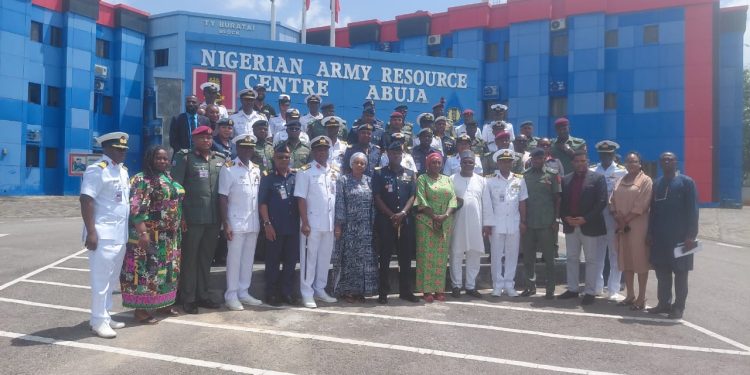By Nkechi Eze
The Defence Headquarters (DHQ), in partnership with the Secure the Future Initiative (SDF), joined the global community in commemorating the 2025 World Mental Health Day in Abuja, underscoring the importance of mental health care as a critical pillar of national security and resilience.
This year’s celebration, themed “Access to Services: Mental Health in Catastrophes and Emergencies,” focused on the urgent need to integrate mental health services into national and institutional responses to crises, disasters, and humanitarian emergencies.
Representing the Chief of Defence Staff (CDS), General Christopher Gwabin Musa, the Director of Civil–Military Relations at the Defence Headquarters, Air Vice Marshal O.F. Akinboyowa, declared the event open. He highlighted the psychological challenges faced by members of the Armed Forces who often serve on the frontlines of national emergencies, providing security, relief, and hope in the most difficult circumstances.
“The unseen wounds of stress, trauma, and fatigue can be just as debilitating as physical injuries,” he said. “Ensuring access to mental health support for service members and affected civilians alike is essential for resilience, recovery, and sustained national readiness.”
Akinboyowa reaffirmed the Armed Forces’ commitment to promoting mental health awareness, early intervention, and access to quality care, stressing that the strength of the military lies not only in its firepower but also in the emotional and psychological stability of its personnel.
“Through this collaboration with Secure the Future Initiative, we are strengthening institutional capacity for mental health support and ensuring no one suffers in silence,” he added.
In her welcome address, the Founder of Secure the Future Initiative, Mrs. Saidatu Adamy, described the commemoration as a national call to action for the security and health sectors to prioritize mental healthcare and ensure it is accessible to all, particularly those serving in high-stress environments.
“Mental health care is not merely a health concern; it is a national security imperative,” she declared. “A mentally healthy force is an effective, resilient, and mission-ready force.”
Mrs. Adamy urged stakeholders to move beyond awareness campaigns to tangible policy implementation, counselling, and rehabilitation frameworks. She commended General Musa for his consistent support and openness to partnerships that promote mental well-being among service personnel and their families.
Also speaking, the Country Director of Secure the Future International Initiative, Dr. Chinaemerem Iwuanyanwu, presented an overview of the programme’s objectives and outcomes. He noted that the event brought together representatives from the military, humanitarian organisations, development partners, and the media to address the growing importance of mental health in crisis response.
“For the Armed Forces, humanitarian workers, and affected civilians, mental health is not a luxury but a necessity for resilience, recovery, and reintegration,” he said.
Dr. Iwuanyanwu commended the Defence Headquarters for its ongoing efforts through the Medical Corps and Civil–Military Relations Department, which ensure that troops and their families have access to psychosocial support both during and after deployments. He highlighted the integration of family support systems, chaplaincy services, and resilience-building programmes designed to boost morale and facilitate post-deployment adjustment.
He further outlined the impact of Secure the Future Initiative’s ongoing projects, which include school mental health programmes with over 1,200 active student members and 24 volunteer counsellors, psychosocial support for more than 500 survivors of trafficking and abuse, and workplace mental health campaigns providing education and one-on-one counselling for staff of government and corporate institutions.
Delivering the keynote address, Professor Taiwo Sheikh, Convener of the Nigerian Suicide Prevention Advocacy Working Group, called for the mainstreaming of mental health into national disaster response and humanitarian frameworks. He emphasized that without mental health support, post-crisis recovery remains incomplete and fragile.
The 2025 World Mental Health Day Symposium concluded with a series of technical sessions, panel discussions, and the presentation of a communiqué outlining strategies for deeper collaboration between defence, health, and humanitarian institutions in psychosocial response, trauma management, and resilience building.
The event served as a reminder that mental health is not only a medical or social issue but a cornerstone of national strength, readiness, and sustainable peace.















